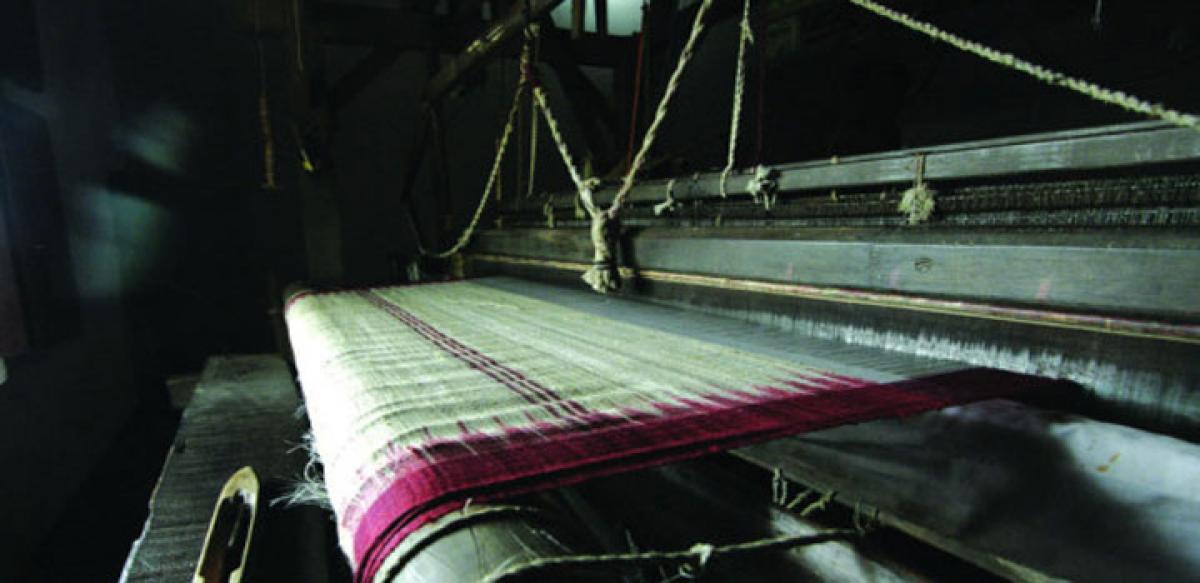Live
- Heavy rains cause disruptions in Tirumala and Tirupati
- Former Soldier Builds Temple for Rajinikanth, Installs New Idol on Superstar’s 74th Birthday
- Mohan Babu’s Daughter Manchu Lakshmi's Viral Post Sparks Controversy Amid Family Disputes
- NIST hosts alumni meet
- Upcoming Telugu OTT Releases: A Treat for Telugu Cinema Lovers in December
- Vedamrit Honey’ launched
- Arjun Das Brings Mufasa to Life in Tamil
- Odisha move to prepare maritime perspective plan
- Jal Jeevan Mission empowering women in rural areas: PM Modi
- Pradhan urges Nadda to set up pharmacy unit in Odisha
Just In

For those who are clad in hand-woven fabrics of myriad hues, life may be colourful, but not of course for the weavers who strive to get the threads together day in and day out. Weavers in Mahbubnagar are facing tough time due to drought and decreasing demand for hand-woven cloths. Tussar weavers, who were once in huge demand, are now struggling to earn a living by practicing their age old traditio
Mahbubnagar: For those who are clad in hand-woven fabrics of myriad hues, life may be colourful, but not of course for the weavers who strive to get the threads together day in and day out. Weavers in Mahbubnagar are facing tough time due to drought and decreasing demand for hand-woven cloths. Tussar weavers, who were once in huge demand, are now struggling to earn a living by practicing their age old traditional profession.
Tussar is synonym to silk saris. While women flaunt beautiful silk saris, political leaders and high profile persons wear Tussar cloth, which reflects their status and luxury. Ironically, the persons who weave this Tussar cloth are reeling under poverty and struggling to survive.
Telangana is the only State in the country where this cloth is woven. This cloth is particularly available in four places in Telangana. Two places are located in Mahbubnagar itself, while the remaining two are in Adilabad and Karimnagar districts.
In Mahbubnagar district, which has already been hit hard due to lack of rains and crop failure this season, 150 families in Pothireddypally and Tovvapur villages in Kosgi Mandal and Hakimpet, Dudyala in Bomraspeta mandals are finding it difficult with no profit margins available. Similar is the fate of Tusser weavers in Macherla of Adilabad and Mahadevpur in Karimnagar districts.
Tusser in Telangana slang is called as Atkari, while according to government records, this is known as ‘Devangula’. The specialty of this fabric is, it is strong and at the same time of high quality. The raw material for Tussar cloth is extracted from the pupas formed by caterpillars similar to that of the silkworm.
The caterpillars are reared in semi-hemispheric handmade bamboo baskets by feeding them with mulberry leaves. When grown to enough size, they are taken to forest and released on ‘Maddi’ and ‘Cheramani’ trees, where they eat the leaves of those trees and roll up to become pupas by releasing a sticky saliva like substance, which later becomes the pupa body, covering the entire worm as a
protective layer.
In the later stage of hibernation, the worm comes out as a butterfly and the pupa is collected by the weavers. The outer covering of the pupa so collected is boiled for two hours and dried up. Later, the wavers extract the ‘Tussar’ which looks similar to silk but its colour is light golden.
According to weavers, it takes almost 10 persons to work five days continuously on a handloom to weave a ‘Than’ (16 metres) of Tussar cloth. “One person can extract 150 grams of Tussar fabric from 300 pupas. It takes three persons to work for five days to weave a cloth of three metres,” says a weaver.
The rising costs of raw material and fall in the demand of Tusser cloth put the weavers in quandary. “Currently only 50 families are working on eight handlooms in the district. We are not getting proper profit margins for Tussar cloth. The costs of raw material skyrocketed 10 times from Rs 250 last year to Rs 2500 today,” said Chandramouli, a weaver.
“Many weavers are going for alternative professions. We demand that the government continue to supply raw material at 50 per cent subsidy and help us get proper profit margins to sustain,” said Kasturamma, Weaver’s Society president, Pothireddypally village of Kosgi Mandal.

© 2024 Hyderabad Media House Limited/The Hans India. All rights reserved. Powered by hocalwire.com







